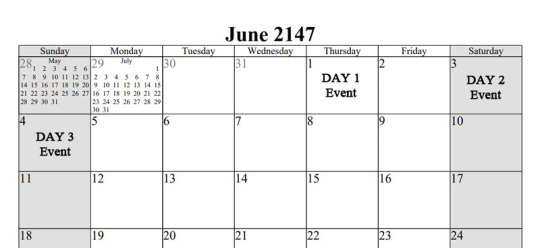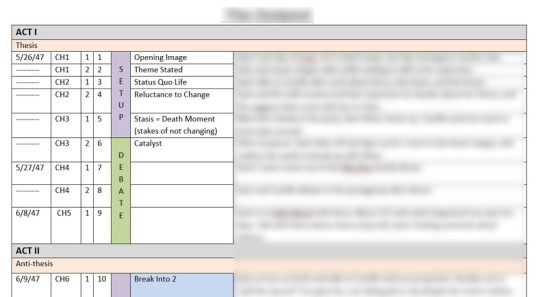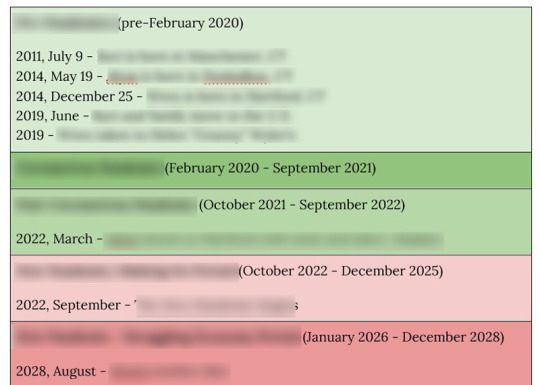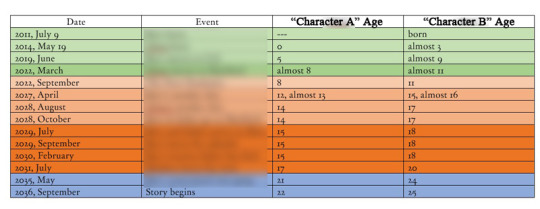22 - He/Him - A mess of all my hopefully interesting drivel with a few other things sprinkled on top. I use the queue system for regular posting because sometimes my sleep schedule is really, really bad.
Don't wanna be here? Send us removal request.
Text
“There is no greater agony than bearing an untold story inside you.”
— Maya Angelou
959 notes
·
View notes
Note
"Don't put numbers into your stories." Jeezus.
Guide: Keeping Numbers & Number-Related Details Straight in Your Story
I was midway through my answer when I realized this would be a good opportunity for a quick guide.
About That Post...
Honestly, I think the OP was probably a bit of a tongue-in-cheek, hyperbolic rant from a writer who had a frustrating review or critique. The problem is, a lot of people seem to be taking it as genuine/good advice, and that really concerns me.
Obviously, it's fine to be vague about dates, ages, distances, or anything else if that's what you want to do. But don't leave numbers out because you're not willing to do the work to keep your story's details straight. Doing the work to figure that stuff out and keep it straight is part of your job as a serious writer.
Hey, Buddy! Let's Do Some Research!
Look, I get it... when you're excited about a story idea, you just want to go wild and start writing. But if your story uses real world people, events, locations, items, or other elements--or heavily relies on them as inspiration--you need to sit down and do some research.
This doesn't mean you have to choose exact dates for your story if you don't want to. But if your story is loosely set in the 1880s (or inspired by an 1880s setting,) you'd better have a good idea of what did and did not exist in the 1880s so you can be sure you're not using a 1914 fashion trend or 1700s slang.
And, doing research doesn't mean you have to research every single element of your story before you start writing. You can stop and research as you go. In the middle of my writing session tonight, I spent 15 minutes researching what kind of pine tree would grow near the coast in my WIP's inspiration setting. And even though that location will never be named in my story, I care about my writing enough to take the time to make sure my details are accurate.
WQA’s Guide to Internet Research Researching an Historical Topic Writing About Difficult to Research Topics
Timelines: A Writer's Best Friend
Whether or not you choose to be specific about dates in your story, I strongly advocate the use of a story timeline, even if you're not usually a "planner." Having a detailed story timeline (that includes important back story events) helps ensure that you don't mix up dates, lose track of how much time has passed between events, or create overlapping events.
There are loads of different ways you can create a timeline, and no way is better than any other. You can jot important dates and events down on post-its, use an app, draw out a timeline on a piece of paper, create something in Word... whatever you want to do is great! Here are some different timeline styles I've used. Some of these are timelines from actual WIPs.
Standard Line Timeline

Calendar Timeline (You can print these out at Time and Date...)

Basic Scene List & Timeline

Complex Scene List & Timeline (This one is based on Save the Cat!)

Color-Coded Timeline

And, if you're like me and you have trouble keeping character ages straight throughout important back story events, I give you...
The Color-Coded Character Age Chart

And, honestly, that's how you keep numbers and number-related details straight in your story. Research and timelines. It's just that simple!
So, don't be afraid to include numbers or number-related details in your story if you want them there. :)
•••••••••••••••••••••••••••••••••
Have a writing question? My inbox is always open!
Visit my FAQ
See my Master List of Top Posts
Go to ko-fi.com/wqa to buy me coffee or see my commissions!
610 notes
·
View notes
Text
prompt 1654
We measure the worth of something by how much pain it causes when it’s lost, so if people are slaughtered or indiscriminately killed in our fiction and no one grieves, we end up devaluing the worth of human life. The more pain someone’s death causes, the more value their life had and, by inference, the more value our lives have.
–Steven James, Writer Unboxed
121 notes
·
View notes
Text
“Creative activity is a type of learning process where the teacher and pupil are located in the same individual.”
— Arthur Koestler
225 notes
·
View notes
Note
any tips on editing?
Editing! So exciting!
Correct me if I’m wrong, but I have never known a writer without a strong opinion on editing. Some people love it, some hate it. I’m hoping these tips might slowly push you to the latter.
Disclaimer: I don’t do a ton of editing. I spend most of my time trying to get my novel ideas to actually work on paper, and haven’t made it to that point yet. However, I have made it there with a few short stories, and while most of the advice probably transfers over, take this with a grain of salt if it doesn’t work for your particular wip.
Without further ado, here are some of my tips on editing your writing!
First, get rid of the idea that editing = trashing your work. Lots of writers are afraid of editing because it’ll make them realize everything they don’t like about their work. In reality, we edit our work to improve it and help it grow, not to criticize our first draft, which is undoubtedly not going to be the best work we’ve ever produced.
Whenever possible, always do your first bits of editing on paper. There’s definitely a psychology behind scribbling all over your manuscript and how it helps you make more thorough edits. If you don’t have access to a printer, try an annotation app on a computer or tablet.
Before an editing session, make a list of the things you want to accomplish in that session. “Add more physical description”, “enhance the relationship between chars. A and B”, and “break down chapter 4” are all examples of notes I wrote to myself while editing this year. That way, you’ll know what to keep an eye out for while rereading.
Split it up! Especially if you’re writing a longer work, editing can be really intimidating. Go chapter by chapter, or give yourself ten pages at a time. It’ll feel a lot more manageable.
Along with that, take your time. Depending on how thorough you are, this can be a painstaking process. This is why books take so long to come out! It’s supposed to take a long time, so don’t stress about getting it done quickly.
Do multiple sessions. Don’t expect to edit your work once and have it ready for print; you’ll need to go through it quite a bit. This is normal! Some authors have revised their books 50 times. You probably won’t need that many times, but don’t be surprised if this takes longer than it took you to write your first draft.
GET A BETA. This is probably the best advice I can give you. A beta will give you a fresh set of eyes, as well as a person to bounce questions off of (see my suggestions here). Your beta reader can be a writer friend, a non-writer friend (more opinions here), someone you meet in an online writing community… as long as they know what they’re in for (and you’re willing to compensate them for their work!), anyone will do.
Break it up. Editing is exhausting sometimes. Have another writing project going that you can work on in between sessions to prevent burnout.
Retype. This is controversial, and believe me, it is a PAIN IN THE ASS. But it’s also one of the most useful editing techniques I’ve encountered. Pull up your manuscript and a blank document side-by-side, and retype it. You’ll find yourself correcting typos, adding and removing details, and editing without really realizing it. I don’t know if I would recommend this for novels unless you really wanna put yourself through that, but I would absolutely recommend for flash fiction, short stories, and individual scenes and chapters that are really giving you a hard time.
Show some love! To keep your morale up, try editing as if you were editing a friend or classmate’s work. Instead of scribbling out that really frustrating paragraph and writing “THIS SUCKS”, mark it with a “having trouble understanding this part”. Instead of just pointing out everything that’s not working, also note where it is! Highlight your favorite snippets, characters, dialogue, etc. Yeah, you have a lot of work ahead of you, but look at all the great work you’ve already done!
Happy editing! (And please send me more questions about writing!!)
1K notes
·
View notes
Text
you can explain why it’s important for aspiring authors to read published books and not just fanfiction without condescending to fanfiction authors/readers and implying it’s inherently of lesser quality
52K notes
·
View notes
Text
Catherine: 1.) Her father's Bible. There are many things penciled into it—musings on certain passages, highlights of important phrases and statements with deeper meaning, etc—and being able to keep such a personal thing with her helps her maintain a deep connection with him. 2.) Her leg. It's a leather and wood prosthesis with a lockable knee joint. It's quite primitive by modern standards on account of a severe lack of technological advancement in her society since a world-changing event generations ago. Even though it has problems and isn't perfect, she doesn't take it for granted. 3.) Her rucksack. It's a mixed bag of things that bring her joy, such as interesting finds around town or shiny objects. Most of her valuable possessions are in this rucksack, and so she takes it with her wherever she goes.
prompt 1634
Name three things your character always has with them and why they matter.
#writing exercises#daily writing prompts#creative writing prompts#writing for fun#writers of tumblr#writer#creative writing#my writing#writers on tumblr#writing#oc character#creative fiction#short fiction#fiction
173 notes
·
View notes
Text
Quick tip
If you're trying to improve writing productivity during the time you're writing, consider where you're working and what's around you.
A lot of people enjoy working in their pajamas, but others find it makes them feel kinda lethargic.
Some find it easier to work when there's more stuff around them, others find the clutter distracting.
Some people need to work at a table where they can sit up straight and have their computer/notebook on a flat hard surface. Others find it more comfortable lounging on a couch or bed.
A lot of people enjoy writing where there's ambient noise or music. Others need absolute quiet.
The point is that there's no wrong way to set up a writing area, but it's worth experimenting to see what combination works best for you, as setting does make a difference.
654 notes
·
View notes
Text
Some day I want to see a show that does the “no filler episodes” thing from the opposite direction. Just a whole season worth of low-stakes character pieces that seem to move the overall story absolutely nowhere, then episode 26 pulls all the triggers at once and this massive Rube Goldberg machine of a plot the show’s been quietly setting up in the background the whole time hits you like a truck.
170K notes
·
View notes
Text
Some stuff I haven’t written yet because I’m uninspired/lazy
A terraformed Mars where ancient alien robotics are found beneath the surface after decades of excavation, leading to all sorts of bullshit
A modern take on Pandora’s box
A classic cabin in the woods horror, except the main character is mute
Some kind of fully cheesy best friends to lovers except it is not only excruciatingly awkward but in the middle of a war zone so STAKES
Grounded desert fantasy in a low magic setting
#writing#fiction#creative writing#writers on tumblr#writer#writers of tumblr#writing for fun#writing ideas#story ideas#stories
0 notes
Text
“Ok… what are you doing?” Vanessa asked, head cocked slightly, observing her best good friend Janelle pull a clove of raw garlic out of her backpack and bite it like an apple. After a moment, her eyes went cross and her lip curled, and she spat the mess to the ground.
“I think I might be part-Vampire.” Janelle said, wiping her tongue on her shirt.
“I’m pretty sure raw garlic is just gross, Jan. Besides, you don’t burn or sparkle in the daylight. Vampire wouldn’t make any sense.”
Janelle threw her hands up in exasperation. “Come on, though. You heard my mom the other night. I’m part-something! Maybe I’ve only got, like recessive traits, and I only got the ‘I hate garlic’ bit.”
“I just think your method of testing is… dumb.” Vanessa said plainly. “If you want to figure out what daddy was, you’re going to need to do something other than bite garlic.”
“I don’t know!” Janelle said, putting her face in her hands. “I thought my dad was my dad, you know? And now I don’t know what to think. I feel like in the past few days I’ve done more crazy, goofy stuff than I have in my whole life up to this point. There’s nothing I haven’t tested.”
“Alright.” Vanessa hummed, sitting up a bit straighter. “Well, what have you tested? Obviously the garlic, and I know you’ve lied to your mom a bunch before so we can cross Fae off the list.”
“Dang.” Janelle huffed. “Faerie dad would have been pretty cool.”
“Have you gotten any hairier recently?” Vanessa asked.
“What?”
“You know. Like a Werewolf? Or maybe some other Were-animal?”
“I think I would know if I was a Werewolf, dude! That would be a problem!”
“Jeez, okay, forget I asked.” Vanessa mumbled. “What about a Centaur? That would make you quarter Centaur, and that might explain why you don’t have the horse legs.”
“Well I would just be a Satyr at that point, right?”
“I think Satyrs are meant to be goats.”
“Half-goats.” Janelle corrected, throwing her head back. “Good god, am I quarter-goat?”
“What about Bigfoot? Is he real?”
“What? No. Bigfoot is not real, don’t be ridiculous. And why are all of your guesses big and hairy? I don’t want to think about my mom having sex with...”
“Okay, okay! What about like… a Gnome?”
Janelle narrowed her eyes. “A Gnome?”
“Or a Dwarf. Come on, you’re kind of short.”
“A little.” Janelle said. “I’m average height. But Gnomes are so...”
“... What?” Vanessa asked perplexed. “Janelle, don’t tell me you’re gonna be racist against Gnomes right now. My brother married a Gnome.”
“I’m not being racist! I didn’t even say anything! I just don’t think that my dad was that small is all. Or is small.” A hand went to Janelle’s head. “I’m worried that we’re almost past all of the normal shit.”
“Well what else is there?” Vanessa asked. “I mean, I suppose demons and devils are an option, but there are so many of those. It’s a broad category.”
“Okay, now you’re the one being racist.” Janelle said. She slumped back onto her bed and closed her eyes, thinking hard. There was a small pause, and then a hot burning sensation hit her hand. “Ow!” She yelled, and she shot back up quickly.
“Did that hurt?” Vanessa asked.
“Yes! Yes, that hurt, what was that?!”
Vanessa raised her eyebrows and lifted her hand up a bit to reveal the source of the pain. Janelle’s eyes went wide when she saw it: the small crucifix necklace that Vanessa wore everywhere that she went.
“Dude, what?” Janelle asked. “Why would…”
“When was the last time you came over to my house?”
“I don’t... “ Janelle paused. “... a really long time ago? I remember the last time I was over I didn’t feel good and Mom had to drive me home because I got sick in your bathtub.”
“Jan, there are crosses all over the place in my house.”
Janelle didn’t know what to say. “Are you saying what I think you’re saying?” She asked after a few moments of silence. Vanessa nodded, and Janelle groaned. “Jesus Christ.” She said.
Vanessa sighed. “You should probably call your mom.”
Your mother admits to you that you have some ‘supernatural’ blood in your veins… but she’s not sure what kind, since she played the field a lot.
#writing prompts#writing for fun#writers of tumblr#writer#writing#creative writing#my writing#writers on tumblr#short fiction#storytelling#stories#short story#story
5K notes
·
View notes
Text

This is a 4k map of my D&D campaign setting that I made last year using Inkarnate. Pretty intuitive program, and I'm very pleased with how it turned out. I even got a big ass print sent to me via a poster company and I have it in a tube in my room. Gotta go get it laminated at some point.
#writing for fun#worldbuilding#dungeons and dragons#dnd5e#dnd worldbuilding#fantasy#fantasy world#fantasy worldbuilding#my writing#writing#dungeon master#game master#dnd campaign#dnd#d&d story#d&d art
44 notes
·
View notes
Text
Raise your hand if you ever say ‘im going to write’ and then spend two hours watching youtube videos
82 notes
·
View notes
Text
Quick tip
If you're trying to improve writing productivity during the time you're writing, consider where you're working and what's around you.
A lot of people enjoy working in their pajamas, but others find it makes them feel kinda lethargic.
Some find it easier to work when there's more stuff around them, others find the clutter distracting.
Some people need to work at a table where they can sit up straight and have their computer/notebook on a flat hard surface. Others find it more comfortable lounging on a couch or bed.
A lot of people enjoy writing where there's ambient noise or music. Others need absolute quiet.
The point is that there's no wrong way to set up a writing area, but it's worth experimenting to see what combination works best for you, as setting does make a difference.
654 notes
·
View notes
Text
“Some writers confuse authenticity, which they ought always to aim at, with originality, which they should never bother about.”
— W. H. Auden
571 notes
·
View notes
Text
How to Name Your Characters?
Some authors have an easy time concocting a new character for their stories, but they have a harder time generating new names to give such a character. Here are some writing tips to get your creative juices flowing, help you source different names, and make sure each name fits with the character you’ve created:
Consult the phone book. Grab a random name from the phone book to get yourself started. Then feel free to tweak the real name you find to make it better match your character’s personality. Did you pull up the name Vickie Malone? If you’re developing a character proud of her social status, why not change the name to Vivien Malone?
Grab a baby name book. Baby name books can be found in bookstores, libraries, and online. If they’re good enough for naming a real-life family member, surely they can be good enough for fiction writers seeking the perfect male or female names.
Use a random name generator. The internet is full of character name generator websites. A simple search will bring up a slew of these and get you on your way to choosing a useful list of names to pick from. You can even use a specialized name generator, like a fantasy name generator, to help you pick a genre-appropriate unusual name.
Pay homage to famous names from a book or movie. Imitation is the most sincere form of flattery, so if you want to pay your respect to a bestselling author or screenwriter, find a way to incorporate part of one of their best character names into your own work. This particularly works if you’re writing in the same genre—such as science fiction or superhero comics—as the author to whom you’re paying homage. You can even name a character after an author.
Make use of root meanings. A name meaning can derive from its cultural roots—including Latin, Greek, Sanskrit, or any cultural background. If you research the ancient meanings of certain names, you might be able to seed ideas about your characters in readers’ heads. For instance, the Welsh god of the sea is named Dylan, so this might be a good character name for a mariner. The word linda means “beautiful” in Spanish, so it may be apt to name a gorgeous female character Linda.
Don’t get hung up on finding the perfect name. Ultimately, audiences care far more about a character’s arc and three-dimensionality than their specific name. If you audition different names but find you’re unable to find one you truly like, insert a placeholder and keep writing. You can come back later and brainstorm similar names, or you can just let the placeholder become the final name for your character. At the end of the day, that name choice will not save or sink your manuscript; it will be a small part of a cohesive whole product.
Article Source: here
88 notes
·
View notes
Text
“Some writers confuse authenticity, which they ought always to aim at, with originality, which they should never bother about.”
— W. H. Auden
571 notes
·
View notes